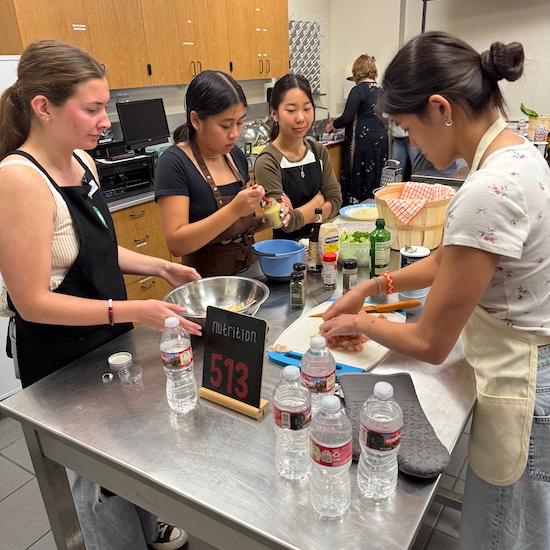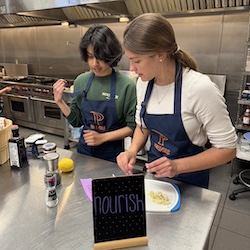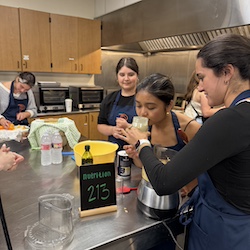Seaver College Nutrition Program Students Compete in Innovative “Chopped”-Style Final

Hummus. Caesar salad. A chocolate chip cookie.
These were the three food items Seaver College undergraduate and graduate nutrition students were challenged to create during their final exam—an innovative high-pressure cooking competition modeled after the popular cooking show Chopped. The capstone project tested four teams of students on the food-preparation skills and knowledge they had acquired throughout the semester by asking them to prepare an appetizer, entrée, and dessert.

“Learning isn't just about exams or quizzes,” says Susan Helm, a professor of nutritional science and the director of the Didactic Program in dietetics at Seaver College. “Our students want hands-on and more leadership experiences. More than ever, they want to know how skills will translate beyond the classroom. Our Chopped event challenged students across a number of different sciences—food science, culinary science, nutrition science, communication science—but maybe most importantly, it helped create community, friendships, and a soul-affirming experience.”
The format of the Chopped challenge was simple. Students from across the nutrition program competed against one another in teams. Helm and Lindsey Correll, a student in the new NUTR 513 Culture and Cuisine course, purchased a wide variety of ingredients for competitors to choose from, and three impartial judges were selected to grade each dish.
Students entered the kitchen not knowing which dishes they would be tasked with preparing. Once assigned, they could not rely on outside resources or recipes to aid in the cooking process. Instead, they could only use the culinary wisdom they had accumulated throughout the program.
With these comprehensive guidelines in place, student competitors were asked to problem solve and innovate. While the quality of the food was important to the exercise, the real goal of the unique exam reached beyond the test kitchen.

“The primary learning objective of this assignment was for students to understand the process behind creating a fine food product,” says Helm. “But beyond that, we wanted them to have fun, work under pressure, and gain experience collaborating. Life moves fast. We have to possess the ability to think in the moment and make decisions quickly.”
Experiential learning opportunities like the nutrition program’s Chopped final exam can be found throughout the Seaver College curricula. Whether it is groundbreaking undergraduate research, community-driven fine arts programming, or immersive capstone courses, Pepperdine’s inventive faculty provide students with hands-on exercises to develop crucial, practical skills.
“We’re helping students build upon experiences for their own lifetime,” says Helm, when discussing the effects of her own innovative teaching tactic. “We’re helping them develop a rich lifetime of social bonds. This is especially true in the nutritional science program.”